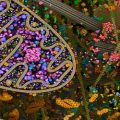随着PTE考生对PTE口语和PTE听力的重视,大家口语和听力的分数得到极大提高,但是PTE阅读渐渐成为考生们新的难题。墨尔本悉尼文波PTE特别为PTE考生们挑选了适合练习PTE阅读的文章,主题,内容,长度都与PTE阅读题中的文章相似。激活学过的词汇,更新新的词汇,提高阅读速度,全面提升自己的阅读能力。
THE botanical kingdom is rife with deceivers. Carrion flowers mimic the smell of rotten meat in order to attract scavenging beetles and flies and then cover them in pollen. Passion vines, beloved by some butterflies as food for their caterpillars, have yellow spots on their leaves that make them look as if they have already had an egg-laying visit from a gravid female. And numerous carnivorous plants lure insects with sweet odours, only to devour them. Now Stefan Dötterl and Annemarie Heiduk, of the Universities of Salzburg and Bayreuth respectively, think they have uncovered yet another form of deception. As they describe in Current Biology, a vegetable called the parachute plant uses chemical signals to trick carnivorous flies into believing the insects those flies prey on are lying wounded inside it.
At first sight parachute plants, which have cone-shaped flowers decorated inside with needle like inward-pointing hairs, look as though they might be carnivorous themselves. They are not, though they come close to it. Insects that enter a parachute-plant flower fall into a pit of pollen and cannot escape past the needle-hairs until the flower begins to wilt—by which time they are thoroughly covered in the stuff.
rife: adj. 流行的;普遍的;盛传的
carrion: adj. 腐肉的; 腐臭的
scavenging: n. 净化; 清除
pollen: n. 花粉
vine: n. [植]葡萄树;[植]藤
caterpillar: n. 履带; 毛虫
gravid: adj. 怀孕的,妊娠的
devour: v. 毁灭;吞食;凝视
parachute: n. 降落伞 v. 用降落伞降落
wilt: v. / n. 枯萎;畏缩;衰弱





